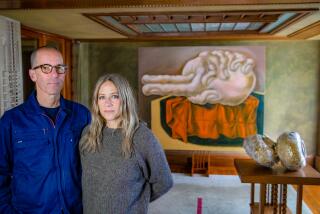A MEMORIAL TO GRANDPA HITCHCOCK
- Share via
The main screening theater at Universal Studios is named for Alfred Hitchcock, and it is a handsome and fitting memorial to Hitchcock the film maker. Last month at UCLA, dedication ceremonies were held for the Alfred Hitchcock Laboratory for research into cystic fibrosis, and it is a uniquely appropriate memorial to the private man.
Hitchcock and his wife, Alma, had one daughter, now Patricia Hitchcock O’Connell, who has three daughters and four granddaughters (a sequence of interest to geneticists and odds-makers).
One of the granddaughters, Melissa, who is 7, is herself a cystic fibrosis victim. But except for mealtime medication to aid her digestion, she leads a normal, active life.
Melissa was diagnosed at the age of 8 months at Childrens Hospital, where she was taken for treatment of a urinary-tract infection. One of the symptoms of the disease is an excess of salt in the sweat, and a so-called “sweat test” confirmed the presence of the disease.
“It’s hereditary, and both parents have to be carriers,” Pat O’Connell says. “There’s a one-in-four chance genetically that a child born to the parents will have cystic fibrosis.” Melissa’s parents, Mary and Jerry, have had two more daughters, but neither has shown any signs of it.
Hitchcock, who died in 1980, was still alive when Melissa was found to have the disease. “He was horrified,” his daughter says. “He couldn’t stand not being able to do anything about it.”
The UCLA laboratory thus seems an ideal outlet for some of the funds from the Alfred Hitchcock Foundation the film maker created in his will. “It’s the one memorial he would have wanted,” O’Connell believes.
One of the most promising avenues for control of the disease is genetic research: identifying the gene that carries cystic fibrosis and then attacking it by genetic transplants. This will be the focus of the work at UCLA.
The disease strikes the young most often, affecting the lungs, the body’s enzyme system and the ability to fight other diseases. Only a few years ago the life expectancy was cruelly short; it is now significantly longer.
Melissa proved to have a mild case; her lungs have not changed, and no other organs have been affected. “She swims and plays soccer, and her aim is to be Punky Brewster,” her grandmother says.
The O’Connells have lived in Lake Tahoe for three years, since Alma Hitchcock died. Pat has opened a fund-raising office in Tahoe for cystic fibrosis. The principal activity is an annual auction of some bottles from her father’s magnificent wine collection--the most recent auction raised $70,000. The UCLA lab will require additional funding, and O’Connell has been writing letters to Hitchcock’s colleagues and friends.
She acted as a child, attended the Royal Academy of Dramatic Arts in London and appeared in three of her father’s films, “Stage Fright,” “Strangers on a Train” and “Psycho.” She also did a small part in “The Mudlark” with Irene Dunne, worked in some of the Hitchcock half-hours and has done commercials. She met her husband on a trip to Europe with her parents, and thereafter devoted most of her time to home and family.
She is a good deal more outgoing than her parents were, but there are glimpses of Hitchcock in her appreciation of slightly mischievous merriment.
The continuing appeal of Hitchcock’s films has produced invitations to film festivals for her, and at Berlin she was asked about a documentary he was said to have made about the concentration camps.
This was news to her. She checked with Hitchcock’s old friend Sidney Bernstein, now Lord Bernstein, who had headed the British Ministry of Information in wartime. He had been allowed into the just-liberated camps with film crews and had subsequently asked Hitchcock to fly to London, look at the footage and make suggestions on how best to assemble it.
It was evidently decided, Lord Bernstein told her, not to do the film just then, while Germany was still in the shaky early stage of recovery. Later a film was made, but not by Hitchcock, although it may have reflected his suggestions.
The later unflattering biographies of Hitchcock are inevitably distressing to his daughter, who knew him as a very private but very loving father and grandfather.
“My daughter,” she says, “has a wonderful idea for a family project, a book that would be called ‘Things I Remember About Hitch’--reminiscences from people in all walks of life. I think it’s sensational; we could donate the royalties to the foundation, for cystic fibrosis.”
It would, in that sense, be an additional legacy from grandfather to granddaughter.
More to Read
The biggest entertainment stories
Get our big stories about Hollywood, film, television, music, arts, culture and more right in your inbox as soon as they publish.
You may occasionally receive promotional content from the Los Angeles Times.










